On April 23, 1992, William Davidson and other dignitaries attended a press conference to formally announce the William Davidson Institute. Davidson’s gift of $30 million to create the Institute was the largest donation to a U.S. business school at that time. Below is a full transcript of Davidson’s speech inaugurating WDI.
“When I first became involved as a business man in centralized economies, such as Hungary and India, it was immediately apparent that many economic decision-makers were severely handicapped by their lack of understanding of basic free-market business principles. Principles which form the foundation of economic success in the West, such as accounting, finance, business organization and marketing, were largely lacking. While the desire to do business was often there, the tools of understanding simply were not.
For example, when Guardian first went to Hungary – more than six years ago – it was considered the most progressive and market-oriented of the communist regimes. Yet we found it virtually impossible to negotiate with our Hungarian counterparts until we had repeatedly reviewed with them the fundamental principles of free market business – an educational process we then had to repeat with each successive government.
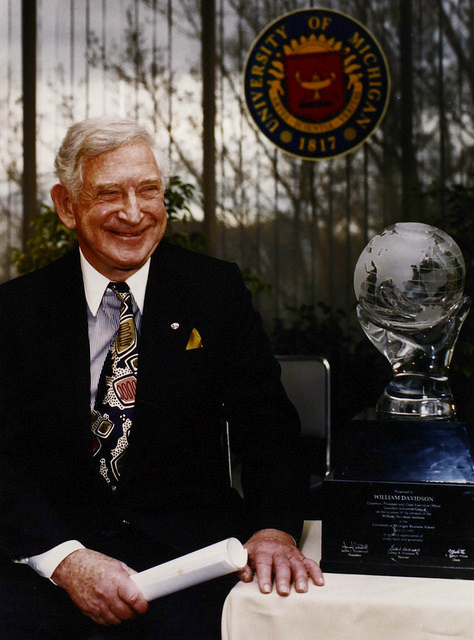
William Davidson, inaugurating WDI in 1992.
After we concluded our joint venture agreement, we moved our entire Hungarian work force to our facilities in Western Europe and the U.S. for intensive training in the way we do business. Our purpose was to educate all of them in our system of individual accountability and responsibility. Under the communist system, no one individual was ever held accountable or responsible. For both the manager and the laborer, the idea of taking personal responsibility for his own performance as judged by the customer was an alien concept.
Yet the desire to learn how to be competitive was certainly there, and our Hungarian work force rose eagerly to the challenge. They absorbed everything we taught them and seized the opportunity to take responsibility for their own operations. Today, it is amazing to see what our all-Hungarian work force has accomplished. From production to sales, our plant in Oroshaza is one of the best-run operations in Guardian’s organization – with high yields, high quality, high productivity and high morale.
I learned from our experience in Hungary that there is a great need for knowledge – not just in Eastern Europe, but on nearly every continent where today there are countries struggling to make the transition of a command to a market economy with minimal social upheaval. But instead of an ad hoc, investor-by-investor approach to education, a broad-based plan is required to address the immediate needs in these countries.
With the swift and total collapse of the communist system, I realized that the problem far transcends the interest of one company or one businessman. We face today a world in disorder, and before us rises the challenge of building a new world order more quickly than at any time in mankind’s history – and with infinitely more at stake. The book is now closed on a period of intense, bi-polar hostility that has defined our lives for more than four decades, and is now for us to determine what will fill the next pages of history. We stand now at the dawn of a new era – an opportunity unprecedented in history. What we do today – by act or omission – will shape the world for generations to come. At no other time has the necessity of success and the consequence of failure been so great.
We know all too well the social upheaval that is caused by economic disorder. We have little choice but to seize this opportunity and to meet the challenge, or risk the prospect of these emerging nations sliding into social and economic chaos. We all have a responsibility to contribute to this great effort. This is our future not just the future of far-away lands. How we respond to this challenge will determine whether our children and our grandchildren will continue to enjoy the peace and prosperity we have known.
Today, the University of Michigan is stepping up to this great challenge and I am proud to be part of its effort. As a graduate of the Business School and a current member of the Visiting Committee, I know that the talent, the energy, and the vision are here to meet the challenge. The Institute’s mission is to equip economic decision-makers in these emerging countries with the tools of commercial success. I am very enthusiastic about the program Dean White and his colleagues have designed to accomplish this, and I am confident in the ability of the University and the Business School to make the program a success.
In a sense, we are not just educators, administrators or businessmen; we are co-workers for the cause of economic and social freedom. We must do all in our power to see that those countries that have already taken that difficult first step forward will continue along the path of progress without faltering. This is no small task, but together we can make a difference. Together we can set an example for others to follow.
It has been a pleasure working with President Duderstadt, Provost Whitaker, Dean White and the others here at the University and Business School to launch this mission. I look forward to our continued work together.”
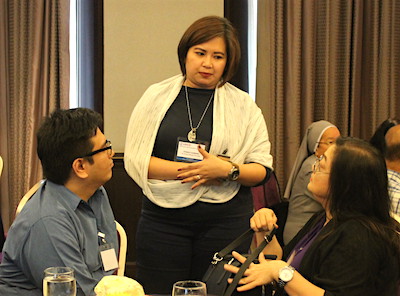
In collaboration with key partners, WDI last month organized a conference in the Philippines that brought together university career service professionals and industry partners to share experiences, progress and best practices for moving graduates from the classroom to the workplace.
The two-day conference in Manila attracted more than 50 people from around the island nation and was part of the Science, Technology, Research and Innovation for Development (STRIDE) program funded by USAID and implementing partner RTI International. For the last three years, WDI has provided technical support for three Philippine university career centers as they work to strengthen relationships with business and industry. The March conference was a forum for career center directors and staff from those three partner universities and others to present what they’ve learned to their peers from across the country.
Filipinos in both academia and in private enterprise recognize the gap that exists between the skills employers expect from recent graduates and the skills universities are providing. Career centers can bridge that gap by equipping students with critical thinking, teamwork, and communications skills – qualities employers seek.
“Forging a stronger connection between industry and academe in the Philippines will result in higher employment, more productivity, and a more globally competitive workforce,” said Amy Gillett, vice president of WDI’s Education Initiative, who helped manage the conference. “This event showed there is significant interest in forming a Filipino network linking colleges and employers. Participants understood they can start it in small ways, through simple steps like meeting over coffee to flesh out more details or starting a Facebook group.”
The conference included four best practice sharing sessions, including three from universities supported by WDI and its consultants. WDI collaborated with the University of Santo Tomas (UST), the Technological Institute of the Philippines (TIP), and the University of Iloilo (UI) by matching the institutions with career center experts based in the United States. WDI and its partners worked to address the priorities identified by each career center. Activities included virtual and in-person support as well as other learning activities over the course of the three-year engagement.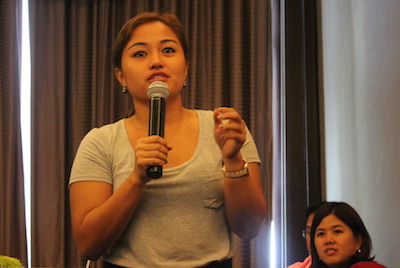
Leaders from the universities presented how they have made significant progress to meet their goals over the past three years and have begun to share lessons learned with other universities as well. In their presentation, representatives from TIP focused on three key areas: providing employment readiness, which involves both preparing students and incorporating feedback from businesses; involving the greater campus community in supporting the career services center; and, focusing on students’ long-term career success.
“Students must be prepared inside and outside the classroom,” said TIP President Elizabeth Quirino-Lahoz. “We need to eliminate the gap between industry expectations and the kind of students schools produce.”
Frank Alejandrino, director of Career Services Director at TIP, mentioned that to-date, 30 universities throughout the Philippines have visited the TIP career center to learn from their practices. “Our doors are open,” he said.
Lucila Bance, head of Career Services at UST, presented the school’s new program: GUTS – Gear Up Tools for Success – a series of career workshops with themes targeting career readiness. Bance also highlighted the fact that the UST modules are delivered to students by partner companies who provide career-related seminars on a variety of subjects including networking and professionalism.
Following a recommendation by WDI consultants, representatives from UI said they have started inviting industry experts to teach for a semester and have seen strong results.
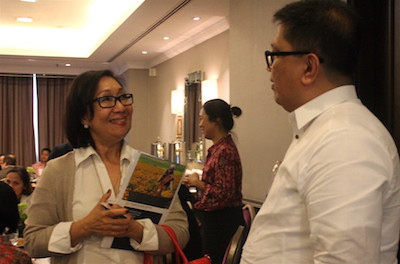 Several participants inquired about building a new professional association in the Philippines. WDI Consultant Andrew Ceperley introduced the idea of a network that would link academia and industry, similar to the U.S.-based National Association of Colleges and Employers (NACE). Participants discussed how such a network might take shape in the Philippines and the industry representatives at the forum contributed to the discussion by highlighting what services and competencies they value in a career center.
Several participants inquired about building a new professional association in the Philippines. WDI Consultant Andrew Ceperley introduced the idea of a network that would link academia and industry, similar to the U.S.-based National Association of Colleges and Employers (NACE). Participants discussed how such a network might take shape in the Philippines and the industry representatives at the forum contributed to the discussion by highlighting what services and competencies they value in a career center.
Farouk Dey, WDI consultant and head of Career Services at Stanford University, led a session that explored several trends for career services. Today’s career services field is all about “connections and community,” he said. Dey suggested career services professionals engage alumni as well as employers, and to get out of the office to better engage with students around the campus community.
Several participants came away inspired and ready to take action at their universities.
“We don’t have funds, but having these ideas will allow me to make small steps. I’m feeling pumped up and ready to make recommendations to my management,” said Horacio Gutierrez, Philippine Women’s University.
El Anelio Barnachea, of De La Salle – College of St. Benilde, added: “This conference was an opportunity for me to understand the industry and academic linkages. Students have problems in terms of career decisions. Now I have a wider perspective on how to match students’ needs with industry demands. It was also important that industry was at this conference so we could hear what kind of competencies they need.”
Please click here to learn more about WDI’s work through the STRIDE program.
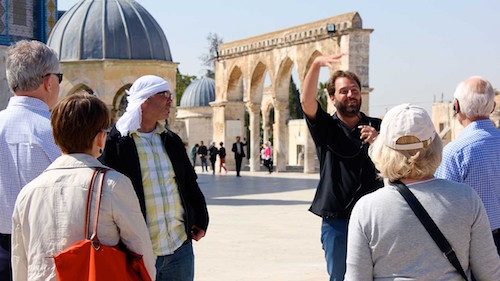
Image credit: MEJDI Tours
Aziz Abu Sarah, a Palestinian who co-founded a tourism business with an Israeli partner to help break down cultural and historical barriers through travel, will discuss how everyday interactions between people from different cultures are an effective peace-keeping tool. Part of the WDI Global Impact Speaker Series, the talk is at 5 p.m. on Monday, April 10 in Room R1230 at the Ross School of Business, and is free and open to the public.
“Aziz Abu Sarah united his drive for cross-cultural understanding, his passion for peace building and his business acumen to co-found MEJDI Tours,” said Amy Gillett, vice president of WDI’s Education Initiative. “This is an impressive social enterprise that shows us the power of bringing together passions and strengths to make positive change in the world. I know that students will be inspired by his story.”
Abu Sarah’s talk, “Social Entrepreneurship for Cross-Cultural Dialogue,” will explore MEJDI’s socially-responsible business model that honors clients and local communities, and is financially and environmentally sustainable. Sarah, MEJDI’s CEO, believes simply being a tourist is an opportunity to break stereotypes and foster understanding, friendship and peace. MEJDI was established in 2009 and is a a certified B Corp, which harnesses the power of business for social change.
Abu Sarah is a TED Fellow and a National Geographic Explorer, an honor given to people who are pushing the boundaries of knowledge and exploration. He has spoken at countless international organizations and universities, including The United Nations, Nexus, TED, Georgetown, Yale and Harvard. He has published articles in The New York Times, National Geographic, and other publications.
Abu Sarah is the recipient of the Goldberg Prize for Peace in the Middle East, the European Parliament’s Silver Rose Award, the Eisenhower Medallion, and the Eliav-Sartawi Award for his Middle Eastern Journalism. He was named one of the 500 most influential Muslims in the World by the Royal Strategic Centre in Jordan from 2010-2016. He also was recognized by then-United Nations Secretary General Ban Ki Moon for his work in peace building.
Abu Sarah’s popular TED Talk, which has more than 1.2 million views, is below.
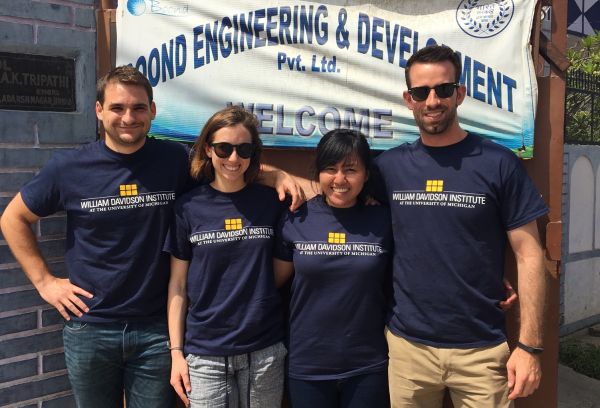
As their 2017 MAP project, U-M students Florian Eizaguirre, Amelia Harris, Matilda Narulita and Chris Atkins are advising Boond, a renewable energy firm in India.
Tom Reidy’s previous work experience and core MBA classes this year at U-M’s Ross School of Business have focused on operating a business in the developed world. That’s one reason Reidy is excited to head to South Africa to work for the startup organization, Mbuyu, as part of the school’s annual Multidisciplinary Action Projects (MAP).
“I’m interested in learning how business strategy differs in low-income, or base of the pyramid, markets because the frameworks we learned in our core classes over the last year have focused on developed markets,” said Reidy, a first-year MBA student. “Also, this will be my first time working with a start-up and dealing with impact investing, so I’m hoping to achieve a good understanding of how those things function.”
Mbuyu is working with South African National Parks to protect some of the world’s most critical honey bee ecosystems while developing a business to produce and sell organic honey. The MAP in South Africa is one of 11 student projects organized and sponsored by WDI. The Institute also is providing funding for two additional MAP projects.
MAP is an action-based learning course offered at Ross in which MBA students receive guidance from faculty advisors. Each project requires analytical rigor, critical thinking, and teamwork. Participating organizations receive top-notch deliverables and data-driven recommendations from the teams of students. (Find out more about WDI’s MAP projects over the years here.)
After learning about their projects and conducting secondary research for several weeks, the students then spend two to four weeks working with their organizations in the field.
Carissa De Young, a second-year MBA who is a dual degree student at Ross and the School of Natural Resources, will travel to India with her MAP team to work for GE Power.
“I’m most looking forward to learning more about the challenges in rural areas and how large companies can use their expertise to provide solutions,” she said.
Below is a summary of each WDI-sponsored MAP project.
African Institute of Management (IAM) – Senegal
Advised By: Paul Clyde, WDI and Ross School of Business
Team Members: Paul Miyamoto, Kaitlyn Fischer, Bradley Rollins
Founded in 1996, the Institut Africain de Management Group (IAM) is one of the leading private business schools in Central and West Africa. IAM is developing a master’s degree program in supply chain. This program will address the needs in Senegal and West Africa generally, by increasing the supply chain management talent available in the region.
The goal of this project is to develop a market entry strategy for a supply chain program at IAM. The team will learn about the program and then conduct competitive analysis and interview businesses that either are or employ potential customers in Senegal.
Aparajitha Foundation – India
Advised By: Paul Clyde, WDI and Ross School of Business; Bob Dittmar, Ross School of Business
Team Members: Diocelyn Batista Rijo, Rachel De Leon, Adam Fitzmaurice, Nancy McDermott
The Aparajitha Foundation is an arm of the Aparajitha Group. It is committed to the cause of creating transformational change in adolescents by using audiovisual technology to deliver life skills training to economically disadvantaged children in India’s Tamil Nadu state.
The MAP team will conduct a market analysis that will enable the creation of a financial model for an overarching ecosystem to support the micro small medium entrepreneurs (MSME) sector in Madurai, India.
Aravind Eye Care System – India
Advised By: Paul Clyde, WDI and Ross School of Business; Thomas Buchmueller, Ross School of Business
Team Members: Kaitie Conrad, Nikita Jambulingam, Siddhi Kaul, Ravi Patel
Aravind Eye Care System is a network of hospitals, clinics, community outreach efforts, factories, and research and training institutes in south India that has treated more than 32 million patients and has performed 4 million surgeries since its 1976 founding.
The student team will work with Aravind’s senior leadership to develop a roadmap for the eyecare system’s future growth.
Banyan Global – Ghana
Advised By: Ted London, WDI and Ross School of Business; Jim Walsh, Ross School of Business
Team Members: Vagisha Goel, Eric Perrin, Adi Singhal, Courtney Tatum
Banyan Global is a development consulting firm that works in five continents. It is implementing a USAID-funded project to increase access, improve efficiencies and expand quality maternal-child healthcare in rural areas. Banyan is working with private maternity home owners who may be nearing retirement on “transformation” options – selling the facility, leasing out the facility, bringing on a partner, bringing on a manager, or bringing on a specialist who will enable the facility to diversify its service offerings.
The MAP team will focus on an in-depth investigation into the the financial constraints and opportunities for private maternity homes in Ghana, with a specific focus on the projected return on specific potential investments, and the feasibility of various credit options to finance those investments.
Boond Engineering & Development – India
Advised By: Ted London, WDI and Ross School of Business; Jane Dutton, Ross School of Business
Team Members: Chris Atkins, Florian Eizaguirre, Amelia Harris, Matilda Narulita
The students will build a strategy around data collection and analysis and finding ways to monetize it. Boond collects a lot of consumer demographic data along with energy usage data from its portfolio of micro-grids in rural communities. It wants to analyze the data and explore ways of sharing its findings to those interested for a price.
CARE International – Egypt
Advised By: Ted London, WDI and Ross School of Business; Jane Dutton, Ross School of Business
Team Members: Andrew Hauser, Colleen Hill, Zack Molnar, Elizabeth Padilla
Working with the Danone Ecosystem Fund, CARE International is working to improve the socio-economic conditions of dairy farmers in Egypt using a collaborative model that engages cooperatives and community development associations in the country.
The MAP students will partner with Danone and CARE International to facilitate access to quality information for dairy farmers to improve their skills and productivity, and develop the institutional capacity, including good governance practices of farmers’ organizations.
GE Power – India
Advised By: Ted London, WDI and Ross School of Business; Sugato Bhattacharyya, Ross School of Business
Team Members: John Barbour, Carissa De Young, Claire Fletcher, Wiles Kase, Christina Lee, Jon McCartney
GE Power provides power generation, energy delivery, and water process technologies to solve issues in local markets.
The student team will develop a go-to-market recommendation for a new set of energy products and services that are focused on providing electricity in emerging markets.
Imperial Health Sciences – South Africa
Advised By: Paul Clyde, WDI and Ross School of Business; Ravi Anupindi, Ross School of Business
Team Members: Jaymon Ballew, Jeremy Egan, Francesco Esposito, Emily Lombardi, Mary Rockas
IHS provides supply chain solutions to the public and private pharmaceutical markets in Africa. It has partnered with several development and global health leaders from the public and private sectors to launch Lulama, an innovative financing partnership that will strengthen independent, community pharmacies in underserved areas, and enable access to quality, life-saving medicines to those who need them most.
The MAP team will assess the Lulama community pharmacy pilot program from the perspective of all the stakeholders for its potential to be a sustainable, scalable and replicable solution, and make recommendations.
ITC Limited – India
Advised By: Ted London, WDI and Ross School of Business; Sugato Bhattacharyya, Ross School of Business
Team Members: Gustavo Calzavara, Rakshit Gupta, Paula Luu, Linh Nguyen
ITC is a major diversified Indian conglomerate that creates multiple drivers of growth by developing a portfolio of businesses in the consumer goods, hospitality, paper, packaging, agribusiness, and information technology sectors.
The MAP team will develop a robust and scaleable business model in the fruits and vegetables space that could lead to a sustainable business that significantly enhances value for farmers in India.
Mbuyu Group – South Africa
Advised By: Ted London, WDI and Ross School of Business; Jim Walsh, Ross School of Business
Team Members: Megan Knoch-Dohlin, Ari Lowell, Tom Reidy, Christine Rickard, Sara Schmidt, Neil Tidwell
Mbuyu Group is working with South African National Parks to protect some of the world’s most critical honey bee ecosystems and strengthen the bee population. The group also hopes to become one of the largest global producers of organic honey.
The student project will develop a comprehensive fundraising communications strategy and materials recommendations to raise $5 million from international funding institutions and individuals. The money raised will support the purchase of 50,000 beehives on behalf of poor communities surrounding the nation parks.
Vayu – Malawi
Advised By: Paul Clyde, WDI and Ross School of Business; Thomas Buchmueller, Ross School of Business
Team Members: Jason Doran, Cazzie Palacios Brown, Maggie Vasquez, Charles Walton
Vayu is a Michigan start-up developing drones to aid medical care such as flying shipments of drugs, blood and other samples to remote villages.
The students will develop a market entry strategy plan for Vayu for Malawi.
Global Fairness Initiative – Nepal
Advised By: Mike Gordon, Ross School of Business; Paul Clyde, WDI and Ross School of Business
Team Members: Molly Hope, Kevin Jones, Julie Smith, Allen Xu
The Global Fairness Initiative promotes a more equitable, sustainable approach to economic development for the world’s working poor by advancing fair wages, equal access to markets, and balanced public policy to generate opportunity and end the cycle of poverty.
The student team will determine a sustainable financial model for Better Brick Nepal, a market-based program that is transforming Nepal’s brick industry by eliminating forced, bonded, and child labor.
Vietnam Partners, LLC – Vietnam
Advised By: Stewart Thornhill, Ross School of Business; Paul Clyde, WDI and Ross School of Business
Team Members: Niall Bachynski, Maddy Bourgeois, Nick Daen, Sara Faurer, Juan Recalde, Aaron Wolff
Vietnam Partners works with companies and investors to build successful businesses that exploit opportunities arising from Vietnam’s accelerating integration into the global economy.
Vietnam Partners in collaboration with the Hanoi School of Business has been requested to set up and lead the development of a Center for Entrepreneurship and Innovation (CEI) and establish a start up venture capital fund.
This WDI Impact Report, entitled “Improving Business Education in the Philippines,” examines the Institute’s contributions to the five-year STRIDE project which was focused on strengthening the science, technology, research and innovation capacity on the island nation. In 2013 the United States Agency for International Development (USAID) launched the Science, Technology, Research and Innovation for Development (STRIDE) program in the Philippines through its implementing partner RTI International. As part of the STRIDE project, WDI was asked to provide academic support for faculty from dozens of Philippine universities. WDI designed and delivered four workshops to teach over 130 professors how to write and teach business case studies while also helping faculty increase engagement with local industries and companies.
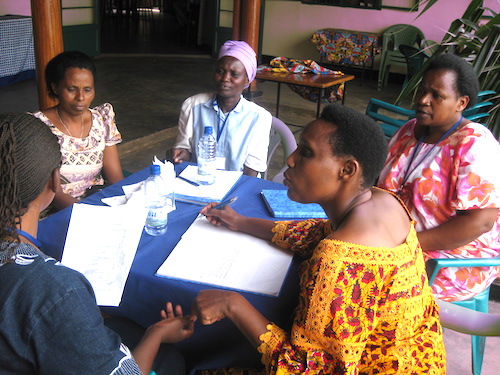
A WDI training session as part of the Goldman Sachs 10,000 Women initiative.
WDI’s Education Initiative is launching the Entrepreneurship Development Center for Emerging Markets (EDC), harnessing 15 years of experience helping entrepreneurs in emerging markets grow their ventures through education, training and consulting.
The new center will strengthen WDI’s long-established commitment to delivering top-notch entrepreneurship education and also highlight expanded offerings and services available to potential partners. The EDC also features a robust resource center of articles, blog posts, case studies, and learning tools.
Also making its debut along with the EDC is the Education Initiative’s proprietary 6M Entrepreneurship Development Model which outlines the six “M’s” — mindset, markets, money, mechanisms, management, mentorship — that WDI uses to design and deliver entrepreneurship education. WDI combines the latest, best practices with innovative pedagogy and learning tools, and then works with regional experts in emerging markets to localize content. The result is a program that is globally applicable and culturally relevant to the partner.
Amy Gillett, vice president of the Education Initiative, said the EDC’s launch is very timely.
“Emerging market countries around the globe are looking for ways to grow and diversify their economies,” she said. “Many of these countries also suffer from high unemployment. We believe entrepreneurship is an effective solution. However, to succeed, entrepreneurs need the proper training, support, and resources and the countries need to create effective ecosystems. The EDC is set up to support these needs.”
For the past 15 years, WDI’s Education Initiative has delivered entrepreneurship training programs in Africa, the Middle East, Southeast Asia, Central and Eastern Europe, and Latin America to owners and managers of small- and medium-sized enterprises.
For example, WDI trained more than 100 entrepreneurs from throughout Morocco under a grant from the U.S. State Department. As part of the Goldman Sachs 10,000 Women initiative, WDI successfully trained 330 women entrepreneurs in Rwanda.
And WDI demonstrated its thought leadership on entrepreneurship education when it convened academics and practitioners at the University of Michigan for the 2011 “Global Summit on Educating Entrepreneurs,” a global conference on how to plan, deliver, and assess world-class entrepreneurship training programs in emerging markets.
Learn more about the Education Initiative in the video below.
Gillett said the Education Initiative’s long history of aiding entrepreneurs makes WDI uniquely qualified to offer successful and rewarding entrepreneurship programs.
“After successfully training hundreds of entrepreneurs and entrepreneurship instructors over the past two decades, we are well-positioned to serve this role,” Gillett said. “We are excited to launch the Entrepreneurship Development Center and expand our entrepreneurship development efforts.”
Update: To watch the presentation please click here.
The WDI Global Impact Speaker Series in March featured the man who established and ran the U.S. State Department’s Global Entrepreneurship Program (GEP), a main tenet of President Barack Obama’s strategy to improve relations between the U.S. and Muslim countries.
Steven Koltai, who served as the senior advisor of GEP from 2009-11, spoke March 14 at the University of Michigan’s Ross School of Business.
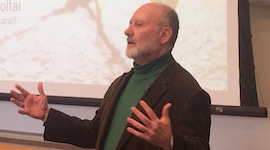
Steven Koltai
Koltai is currently a guest scholar at the Brookings Institution and serves as managing director of Koltai & Co., which looks to build a global entrepreneurship ecosystem. He has more than 30 years of business and entrepreneurship experience, including co-founding Coronet Television Satellite Company (now SES), the world’s largest commercial TV satellite system.
He also has been senior vice president for Strategy and Corporate Development at Warner Bros., a strategic planning consultant at McKinsey & Co., and an investment banker at Salomon Brothers. Koltai is the author of the recent book Peace through Entrepreneurship: Investing in a Startup Culture for Security and Development (Brookings Press, 2016) and writes and speaks frequently about entrepreneurship as a foreign policy tool.
His March talk was the second time Koltai has visited WDI. In 2011, he was the featured speaker at WDI’s Global Summit on Educating Entrepreneurs, an international gathering of development organizations, government agencies, entrepreneurship trainers, microlenders and academics.
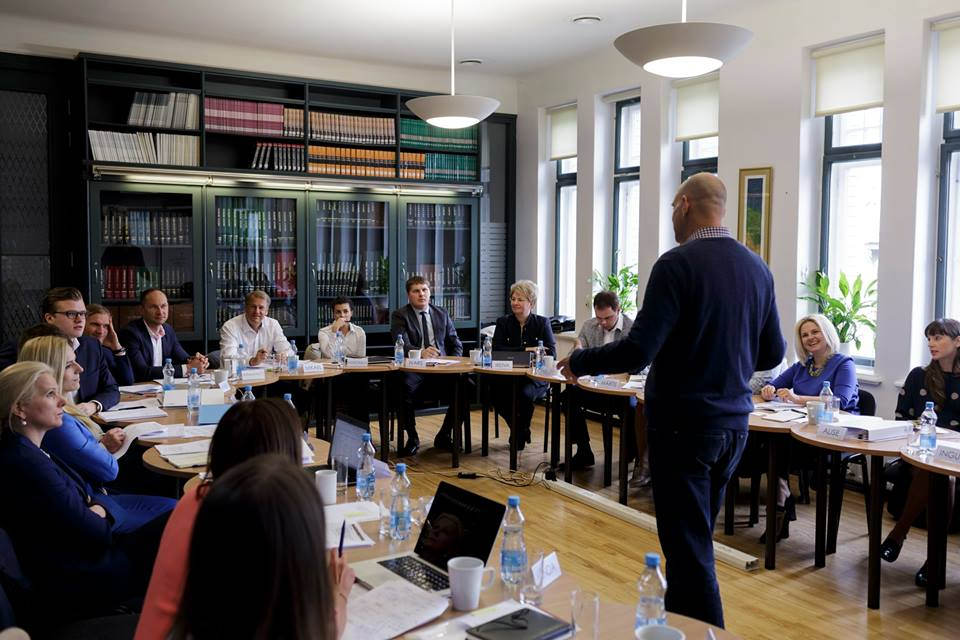
WDI Faculty Affiliate John Branch teaches a marketing module during the 2016 Strategic Management Program in Latvia.
Soon after Robert M. Teeter’s death in 2004, the WDI Board of Directors established a scholarship program in his honor to allow owners and managers of small- and medium-sized enterprises in emerging economies to attend the Institute’s professional education programs for free. Teeter was an advisor to several U.S. presidents and a former WDI board member.
Each year, 20 scholarships are handed out to worthy recipients. Recently, WDI’s Education Initiative spoke with four who attended WDI programs in 2016 to see how they and their organizations were impacted by the sessions. Three attended WDI’s 10-day Strategic Management Program (SMP), and one participated in an inaugural program on Strategic Thinking. Both programs were held at the Stockholm School of Economics in Riga, a longtime partner of WDI Education.
Read the full article and profiles of the four participants here.
Dovilė Pranckevičienė of Lithuania is the co-founder and director of a foreign language training school. “My knowledge was very narrow,” she said. Attending the SMP “was really an eye-opener for me, one who had no background in business management.” She said she “gained a lot of knowledge in a short period of time.”
Aleksandrs Lescinskis has his own law firm in Latvia and also manages a Judo studio and a sports association. He liked the SMP’s condensed timeframe and collaborative atmosphere.
“During a short period of time – two weeks, four modules – you can share your existing experience with professors and colleagues, looking at the same things from different angles, broadening your perspective,” he said. “We are working in different areas, but during this course we can find similar things to discuss, to share. I had to a chance to find out new things, to have new colleagues, new professors, to have communication. All things will help me in the future to go further.”
Santa Krastiņa of Latvia attended WDI’s first Strategic Thinking program. As a leader of an environmental NGO, Krastiņa said she immediately put to work what she learned. Krastiņa shared her training with her colleagues at her organization, and expects their new knowledge to positively impact how they work with partners and how they approach new markets.
“We have a lot to think through about our future – how we will fund ourselves, how we will survive,” she said.
Krastiņais is optimistic the training she received from WDI will help her organization accomplish great things.
“I got new knowledge to put into practice [with] my co-workers,” she said. “Together, we will find a solution.”
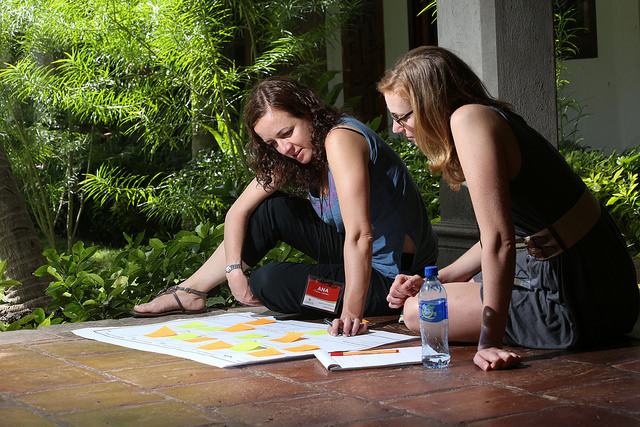
Mary Fritz, pictured right, in Nicaragua for Agora Partnerships.
When Mary Fritz thinks back to her 2012 WDI summer internship in India, she remembers the oppressive heat, the bugs, her illnesses, her inability to communicate, a lack of cultural context, being the constant object of fascination of the locals and taking a shower by pouring water over her head. In short, Fritz said, she was “missing my U.S. life.”
So it might be surprising that Fritz, who has since built a young career helping launch startups in Latin America, fondly refers to this time as an “amazing, multifaceted experience that really shaped me on a lot of levels.” She said her summer in India made her stronger and more independent, flexible, and patient.
“India is extraordinarily beautiful and diverse, and farther removed from Western culture than I had ever been before,” Fritz said. “I learned to be constantly (both) physically and emotionally, uncomfortable. I learned how to be alone. I learned to take bucket showers. I learned a little bit of Hindi.”
Along with the life lessons were plenty of business lessons as well.
“I learned the importance of including the customer in every strategic decision,” she said. “I learned humility. I learned how to connect with people without shared language. And I learned that sometimes you just can’t.”
At the University of Michigan, Fritz enrolled at the Erb Institute, a dual degree MBA/MS program with the Ross School of Business and the School of Natural Resources and Environment. She said she chose U-M for her graduate studies because of the university’s commitment to impact. She also was familiar with WDI’s support of student programs before arriving on campus.
“I’ve always been really interested in social enterprise as a way to address social, economic, and justice issues,” Fritz said. “I wanted to learn what really goes into building an impact company from the ground up, and WDI gave me that opportunity.”
Fritz worked with the social enterprise Wello, which makes water transportation products, including the WaterWheel, designed to help mostly low-income women collect and carry water long distances. Founded in rural India by Cynthia Koenig, a former WDI summer intern as well, Wello has now expanded to Pakistan, Malawi, Zambia, Bangladesh, and Haiti.
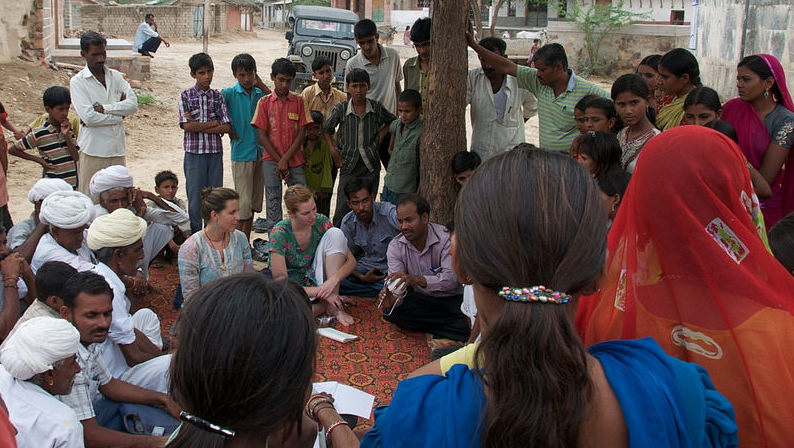
Mary Fritz, wearing a green shirt and white pants, speaks with potential Wello customers. She is seated next to Cynthia Koenig (pictured left), CEO of Wello.
Fritz was based in Mumbai, with frequent travel around the Indian states of Rajasthan and Gujarat. Because Wello was a fledgling startup with a small staff, Fritz worked on a bit of everything. But her main focus was how to get the product to the people who needed it at a price they could afford. There were a lot of manufacturing details to work out, as well as market research and customer interviews to conduct, pricing models to build, and distribution channels to develop. She also studied how to measure impact.
After graduation, Fritz took those valuable lessons and work experiences and began building and launching startup organizations focused mostly on Latin America for Agora Partnerships, a business accelerator. She recently moved to Seattle to work for Lenati, a marketing and sales strategy consulting firm. She will continue to work with startups and nonprofits as well as corporate clients.
“My experience with Wello has definitely influenced my career choices,” Fritz said. “From a functional standpoint, I became really interested in everything that’s involved in bringing a product to market. And I loved working in a startup; every day is different.”
And more than four years removed from that summer in India, Fritz said she still harkens back to those days when faced with a current-day challenge.
“Wello was my first, and definitely most intense, experience conducting customer research and trying to create a human-centered approach to a go-to-market strategy,” she said. “I use those lessons all the time.”
And despite the hardships of that sometimes uncomfortable summer in a faraway land, the internship nevertheless stoked a yearning to work internationally.
“From a personal standpoint,” Fritz said, “it definitely increased my desire to travel and experience cultures beyond my own.”
Note: This is one in an ongoing series of articles profiling past WDI interns and Multidisciplinary Action Project (MAP) team members and their career paths. Additional profiles in the series may be found here.
In a perspective article, WDI President Paul Clyde observes the trend of top business schools establishing institutes and programs designed to help develop businesses that make money and simultaneously provide benefits to society. While Clyde sees merit in the educational endeavor and the business practice, he also believes we must be careful not to undermine the societal impact of for-proft businesses.
As the William Davidson Institute at the University of Michigan (WDI) nears its 25th anniversary next year, I have been looking at how business schools approach development in low- and middle-income countries and noticed an increase in the institutes and programs designed to help develop businesses that make money and simultaneously provide benefits to society at large. Examples include the Social Enterprise Initiative at University of Chicago’s Booth School, the Center for the Advancement of Social Entrepreneurship at Duke’s Fuqua Center, Social Enterprise at Goizueta (Emory University), The Center for Responsible Business at The University of California’s Haas School, and The Social Enterprise Initiative at Harvard. I would also include WDI on this growing list, though social enterprise was not WDI’s focus when it was established in 1992. Of U.S. News and World Report’s top 20 business schools, well over half have some sort of social institute that does work in low- and middle-income countries around the world. Others have created social institutes focused on the United States.
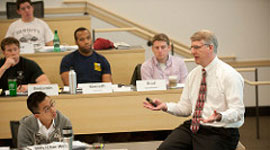
This proliferation of socially oriented institutes within business schools suggests that the business education community sees social enterprise, broadly defined, as an important mechanism for creating change, and perhaps even something that the traditional business subject – for-profit businesses – cannot do. Oxford University’s Skoll Centre for Social Entrepreneurship appears to say just that:
We believe socially entrepreneurial approaches have much to contribute in creating this new market; for rather than pursuing activities that seek to maximise profits at society’s expense, these entrepreneurs put principles ahead of profits for society’s benefit.[1]
This is misleading at least and harmful at worst.
Socially oriented institutes pursue goals that most would agree are worthy – poverty alleviation, environmental sustainability, health provision for the poor, to name a few. It is certainly true that business practices and skills can be used to the benefit of any organization. However, in our zeal within the business education community to pursue these admirable social goals, we risk losing sight of the most powerful mechanisms for affecting economic change: for-profit businesses.
For-profit businesses generate social benefits too. As Adam Smith taught us 240 years ago from a school just a bit north of Oxford, businesses generate these social benefits not because making the world better off is explicitly part of the intention of producers – but because, with a few important exceptions noted below, the pursuit of profits benefits society as a whole. Some of this value accrues to the consumer in the form of “consumer surplus” – the difference between what the consumer pays and the maximum amount the consumer would be willing to pay for the product or service. Some of the value accrues to the producer in the form of “producer surplus”—the difference between what the producer is paid and the lowest amount that the producer would need to receive in order to participate in the transaction. Notably, the value going to producers can—and generally does—get shared with multiple participants on the producer side, including not only investors (debt and equity holders), but also employees and suppliers.
At first blush, this might seem less beneficial than an organization that is deliberately focused on social goals such as poverty alleviation. Such a view, however, misses a major benefit of profit-maximizing ventures. Any company will be attracted to opportunities to increase profits. Companies that identify profit enhancing opportunities will increase their scale, while other companies will jump into the marketplace to compete for the profit opportunities. Both actions lead to growth in output, employment and welfare. Companies with social goals, in addition to or instead of profits, will not have the same impact on their own behavior or on that of others.
Note that a bright line is drawn here between profit-maximizing activities and all other activities, including firms that pursue multiple goals, one of which is profits. This includes social entrepreneurs, organizations pursuing so-called shared value, corporate social responsibility, triple bottom line and myriad other terms, all of which involve a tradeoff of profits for some other goal. For some of these organizations, profits are among the goals, but they are not the only goal. Pursuing another goal in addition to profits requires the possibility of sacrificing some of the potential return on an investment. Such a compromise on the return is, in essence, a subsidy and should be recognized as such. As a result, all things being equal, companies with social goals, in addition to or instead of profits, will not have the same impact on their own behavior or on that of others.
None of this is to say that there isn’t a place for social enterprises. There are some customers who will not be served by purely for-profit activities. An inability to pay can perhaps best be addressed by government provision or by an NGO that doesn’t seek to maximize profits. For example, many services and products within education and healthcare may only be provided by an organization willing to sacrifice some or all of its profits. In these cases, there is a good argument for a social enterprise, and business principles can be applied here just as they are in for-profit enterprises.
However, even in these cases, we must be careful not to undermine profitable activities that, because of the subsidized activities, cease to be provided or are not provided in the first place. It has long been recognized and taught in microeconomic classes that subsidizing products in a low-income economy has a debilitating effect on local businesses trying to produce that product themselves. The classic example of this is agriculture where U.S. policies have often resulted in artificially high prices in the U.S. and thus more output than U.S. consumers are willing to buy. This leads to a problem: the producers (the group the policy was designed to help) can’t sell everything they produce. One solution to dealing with the surplus is foreign aid: the overproduction in the U.S. can be purchased by the U.S. government and then given away to other countries. However, this aid can completely undermine local farmers in the foreign country. I recall teaching this principle one semester in one of my classes and watching a student in the front row become increasingly agitated. She finally spoke up and explained that her family was one of those farmers in a Latin American economy and they had suffered the consequences of this “aid” from the United States. If the tables were turned, and a Latin American firm had tried to offer “aid” to the U.S., the Latin American firm would likely be charged with dumping by the U.S. government.
The risk of undermining the local economy isn’t limited to products. The doctor who flies in to perform surgeries for free is great for those who receive the surgery, but that doctor may unintentionally undermine the ability of the local hospital to charge a price for the same surgery. In doing so, the free surgeon may be putting an institution that provides more complete and continuous healthcare to the community at risk of financial collapse.
In contrast, local businesses that develop models that work in these economies lead to permanent changes in the welfare of a community. Such companies provide a return for investors, jobs for local labor and ready buyers for local suppliers.
Institutes at business schools, including ours, need to keep this in mind when offering programs or developing products to “help” a local community. In general, activities that do not result in continuing subsidies may be less likely to have these harmful effects. For example, assisting in starting up, developing viable business models or providing education might be expected to distort the local economy the least and have a net positive impact. But we should still be very careful. Anything that leads to long-term involvement at a subsidized cost could have a negative net effect.
It is also true that businesses can be harmful. A recent film titled “When Elephants Fight” documents the role of companies in perpetuating the conflicts, rapes and murders that have plagued the Democratic Republic of Congo (DRC) for decades. The companies may not have started the conflict and it may continue without them, but they are participating in transactions of minerals that enable and even encourage this behavior; and they are having a downright evil impact. Humans run businesses. Humans can be evil and so can the businesses that they run. Some of the companies operating in the DRC are an extreme example of the larger category of externalities. Externalities arise when the costs or benefits to a business under or over-state the social costs or benefits. When this happens, the decisions by the business will not coincide with those that are in the interest of society. In such cases, there is a role for governments and/or NGOs.
Thus, my point isn’t that for-profit firms are necessarily going to produce social benefits. Sometimes they don’t. Nor is the point that there is no place for social enterprises that have multiple goals. Significant externalities or instances in which, due to poverty, basic needs cannot be met are some of the common examples in which social enterprises or government involvement may be the only options. Nor is this article a condemnation of the institutes at business schools previously referenced. As noted at the beginning of this essay, WDI was initially established to work with the for-profit firms transitioning from communist to free market economies in eastern Europe and the former Soviet Union; however, over the years the Institute has also worked with social ventures of various sorts.
The point is that we may have overplayed the hand of social enterprises and, in the process, lost sight of the potential power of the for-profit enterprise. An organization that pursues a social mission isn’t necessarily socially beneficial and a for-profit business isn’t necessarily socially costly. In the vast majority of cases, purely for-profit businesses provide significant value to economies. Indeed, it is hard to imagine how an economy is going to develop without them. As educators and advisors we must constantly keep this in mind.
[1] Skoll Centre for Social Entrepreneurship, http://www.sbs.ox.ac.uk/faculty-research/skoll/about-skoll-centre-social-entrepreneurship as accessed on October 12, 2016. The site removed this language, which still exists on an Oxford affiliated site here.